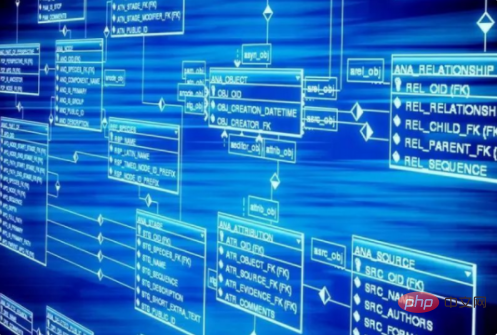What are the basic technologies of big data?
Basic technologies include: 1. Data collection. There are four main sources of data collection, namely management information system, Web information system, physical information system, and scientific experiment system. 2. Data access. 3. Infrastructure, such as cloud storage, distributed file storage, etc. 4. Data processing: collect, organize, clean, and convert data from different data sets to generate a new data set. 5. Statistical analysis. 6. Data mining. 7. Model prediction, such as predictive models, machine learning, modeling and simulation. 8. Results presentation, such as cloud computing, tag cloud, relationship diagram, etc.

#The operating environment of this article: Windows 7 system, Dell G3 computer.
Basic technologies of big data include data collection, data access, infrastructure, data processing, statistical analysis, data mining, model prediction, and result presentation.

#1. Data collection: In the life cycle of big data, data collection is the first step. According to the classification of application systems that generate data from MapReduce, there are four main sources of big data collection: management information systems, Web information systems, physical information systems, and scientific experiment systems.
2. Data access: Big data access adopts different technical routes and can be roughly divided into three categories. Category 1 mainly faces large-scale structured data. Category 2 mainly faces semi-structured and unstructured data. Category 3 faces a mixture of structured and unstructured big data,
3. Infrastructure: cloud storage, distributed file storage, etc.
4. Data processing: For different collected data sets, there may be different structures and patterns, such as files, XML trees, relational tables, etc., which is reflected in the heterogeneity of the data. For multiple heterogeneous data sets, further integration processing or integration processing is required. After collecting, sorting, cleaning, and converting data from different data sets, they are generated into a new data set to provide unification for subsequent query and analysis processing. data view.
5. Statistical analysis: hypothesis testing, significance testing, difference analysis, correlation analysis, T test, analysis of variance, chi-square analysis, partial correlation analysis, distance analysis, regression analysis, simple regression analysis, multiple regression Analysis, stepwise regression, regression prediction and residual analysis, ridge regression, logistic regression analysis, curve estimation, factor analysis, cluster analysis, principal component analysis, factor analysis, fast clustering method and clustering method, discriminant analysis, correspondence analysis , multivariate correspondence analysis (optimal scale analysis), bootstrap technology, etc.
6. Data mining: At present, it is still necessary to improve existing data mining and machine learning technologies; develop new data mining technologies such as data network mining, special group mining, and graph mining; break through object-based data connections, Big data fusion technologies such as similarity connection; breakthroughs in field-oriented big data mining technologies such as user interest analysis, network behavior analysis, and emotional semantic analysis.
7. Model prediction: prediction model, machine learning, modeling and simulation.
8. Result presentation: cloud computing, tag cloud, relationship diagram, etc.
The above is the detailed content of What are the basic technologies of big data?. For more information, please follow other related articles on the PHP Chinese website!

Hot AI Tools

Undresser.AI Undress
AI-powered app for creating realistic nude photos

AI Clothes Remover
Online AI tool for removing clothes from photos.

Undress AI Tool
Undress images for free

Clothoff.io
AI clothes remover

AI Hentai Generator
Generate AI Hentai for free.

Hot Article

Hot Tools

Notepad++7.3.1
Easy-to-use and free code editor

SublimeText3 Chinese version
Chinese version, very easy to use

Zend Studio 13.0.1
Powerful PHP integrated development environment

Dreamweaver CS6
Visual web development tools

SublimeText3 Mac version
God-level code editing software (SublimeText3)

Hot Topics
 1386
1386
 52
52
 PHP's big data structure processing skills
May 08, 2024 am 10:24 AM
PHP's big data structure processing skills
May 08, 2024 am 10:24 AM
Big data structure processing skills: Chunking: Break down the data set and process it in chunks to reduce memory consumption. Generator: Generate data items one by one without loading the entire data set, suitable for unlimited data sets. Streaming: Read files or query results line by line, suitable for large files or remote data. External storage: For very large data sets, store the data in a database or NoSQL.
 C++ development experience sharing: Practical experience in C++ big data programming
Nov 22, 2023 am 09:14 AM
C++ development experience sharing: Practical experience in C++ big data programming
Nov 22, 2023 am 09:14 AM
In the Internet era, big data has become a new resource. With the continuous improvement of big data analysis technology, the demand for big data programming has become more and more urgent. As a widely used programming language, C++’s unique advantages in big data programming have become increasingly prominent. Below I will share my practical experience in C++ big data programming. 1. Choosing the appropriate data structure Choosing the appropriate data structure is an important part of writing efficient big data programs. There are a variety of data structures in C++ that we can use, such as arrays, linked lists, trees, hash tables, etc.
 Five major development trends in the AEC/O industry in 2024
Apr 19, 2024 pm 02:50 PM
Five major development trends in the AEC/O industry in 2024
Apr 19, 2024 pm 02:50 PM
AEC/O (Architecture, Engineering & Construction/Operation) refers to the comprehensive services that provide architectural design, engineering design, construction and operation in the construction industry. In 2024, the AEC/O industry faces changing challenges amid technological advancements. This year is expected to see the integration of advanced technologies, heralding a paradigm shift in design, construction and operations. In response to these changes, industries are redefining work processes, adjusting priorities, and enhancing collaboration to adapt to the needs of a rapidly changing world. The following five major trends in the AEC/O industry will become key themes in 2024, recommending it move towards a more integrated, responsive and sustainable future: integrated supply chain, smart manufacturing
 Application of algorithms in the construction of 58 portrait platform
May 09, 2024 am 09:01 AM
Application of algorithms in the construction of 58 portrait platform
May 09, 2024 am 09:01 AM
1. Background of the Construction of 58 Portraits Platform First of all, I would like to share with you the background of the construction of the 58 Portrait Platform. 1. The traditional thinking of the traditional profiling platform is no longer enough. Building a user profiling platform relies on data warehouse modeling capabilities to integrate data from multiple business lines to build accurate user portraits; it also requires data mining to understand user behavior, interests and needs, and provide algorithms. side capabilities; finally, it also needs to have data platform capabilities to efficiently store, query and share user profile data and provide profile services. The main difference between a self-built business profiling platform and a middle-office profiling platform is that the self-built profiling platform serves a single business line and can be customized on demand; the mid-office platform serves multiple business lines, has complex modeling, and provides more general capabilities. 2.58 User portraits of the background of Zhongtai portrait construction
 Discussion on the reasons and solutions for the lack of big data framework in Go language
Mar 29, 2024 pm 12:24 PM
Discussion on the reasons and solutions for the lack of big data framework in Go language
Mar 29, 2024 pm 12:24 PM
In today's big data era, data processing and analysis have become an important support for the development of various industries. As a programming language with high development efficiency and superior performance, Go language has gradually attracted attention in the field of big data. However, compared with other languages such as Java and Python, Go language has relatively insufficient support for big data frameworks, which has caused trouble for some developers. This article will explore the main reasons for the lack of big data framework in Go language, propose corresponding solutions, and illustrate it with specific code examples. 1. Go language
 Getting Started Guide: Using Go Language to Process Big Data
Feb 25, 2024 pm 09:51 PM
Getting Started Guide: Using Go Language to Process Big Data
Feb 25, 2024 pm 09:51 PM
As an open source programming language, Go language has gradually received widespread attention and use in recent years. It is favored by programmers for its simplicity, efficiency, and powerful concurrent processing capabilities. In the field of big data processing, the Go language also has strong potential. It can be used to process massive data, optimize performance, and can be well integrated with various big data processing tools and frameworks. In this article, we will introduce some basic concepts and techniques of big data processing in Go language, and show how to use Go language through specific code examples.
 AI, digital twins, visualization... Highlights of the 2023 Yizhiwei Autumn Product Launch Conference!
Nov 14, 2023 pm 05:29 PM
AI, digital twins, visualization... Highlights of the 2023 Yizhiwei Autumn Product Launch Conference!
Nov 14, 2023 pm 05:29 PM
Yizhiwei’s 2023 autumn product launch has concluded successfully! Let us review the highlights of the conference together! 1. Intelligent inclusive openness, allowing digital twins to become productive Ning Haiyuan, co-founder of Kangaroo Cloud and CEO of Yizhiwei, said in his opening speech: At this year’s company’s strategic meeting, we positioned the main direction of product research and development as “intelligent inclusive openness” "Three core capabilities, focusing on the three core keywords of "intelligent inclusive openness", we further proposed the development goal of "making digital twins a productive force". 2. EasyTwin: Explore a new digital twin engine that is easier to use 1. From 0.1 to 1.0, continue to explore the digital twin fusion rendering engine to have better solutions with mature 3D editing mode, convenient interactive blueprints, and massive model assets
 Big data processing in C++ technology: How to use in-memory databases to optimize big data performance?
May 31, 2024 pm 07:34 PM
Big data processing in C++ technology: How to use in-memory databases to optimize big data performance?
May 31, 2024 pm 07:34 PM
In big data processing, using an in-memory database (such as Aerospike) can improve the performance of C++ applications because it stores data in computer memory, eliminating disk I/O bottlenecks and significantly increasing data access speeds. Practical cases show that the query speed of using an in-memory database is several orders of magnitude faster than using a hard disk database.



